#emotional rejection
Text
Emotional hyperarousal?
I thought I was too sensitive when I got intense (read: mostly angry and sad) reactions to people criticizing things I like or rejecting them as if they didn't exist. And when I say intense, I mean thinking about that for hours on end, thinking about a way to confront others. Ending up not doing it because eventually, no one cares. I am an adult, I should be able to manage my emotions! Then I found out it might be emotional hyperarousal?
I've never been able to control my emotions. I think, get very intense about it, and I try to keep it inside myself because "dude, you can't get an opinion influence you that much!" I'm a little ashamed of this, of being intense to the point of looking immature.
I remember when I was younger (as in mandatory school). I used to get angry at everyone who pissed me off because I couldn't keep my mouth shut. This resulted in being rejected a lot by people (and hated), and this is also something sensitive to me. Why couldn't I manage these emotions better? Why no one noticed and helped me? And this is also connected to emotional sensitivity and rejection sensitivity.
I am glad that I'm able to interpret these things now, but I wish I knew it sooner. I've lived most of my life being called "too much" or "exaggerated" or being belittled for my emotional reactions to how other people treated me like shit or how I reacted to a lot of these things. I wish I knew how to emotionally regulate better now, because that's one of the reasons I feel so burned out lately. I can't manage my emotions properly and I wish I did.
#Tweety.txt#emotional rejection#emotional hyperarousal#emotionally sensitive#personal introspection#if you know more please interact with this post
4 notes
·
View notes
Text
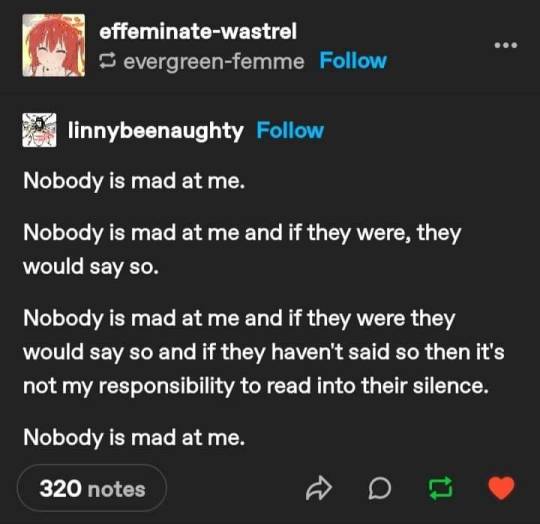
#rejection sensitive dysphoria#rejection sensitivity#social anxiety#masking#neurodivergent#emotional labor#mindfulness#affirmations#communication#interpersonal#relationships#self compassion#codependency#boundaries#people pleasing#fawning#perfectionism#coping skills#coping
3K notes
·
View notes
Text
I know Jack and Maddie's relationship in canon is probably MEANT to be seen--depending on the episode--as a pretty bog-standard, 2000s-era "idiot big dad and exasperated, smart wife who puts up with him" trope.
BUT
my personal favorite interpretation is that BOTH are equally genius engineers who are also equally on the autistic spectrum, with a specific hyperfixation on ghosts and mad science.
The main difference is that Maddie has siblings and female social expectations, so she had to learn how to mask in ways that are seen as sociable and polite and attractive and "smart." When she does bumble major social cues (such as not recognizing Vlad's flirting until Danny points it out decades later, or humiliating her kids by showing up in a hazmat suit at school), it feels more "socially acceptable" from her.
She genuinely loves Jack because he could not care less about her being Feminine or Socially Acceptable. He just wants to shout with her about ghosts! So the nanosecond she's around him she can yank the mask off and go chasing spirits with a toaster turned into a machine gun.
#danny phantom#jack fenton#maddie fenton#leif babbles#i honestly could go on for pages about this but I'll stop myself lol#like i don't think she meant to shun Vlad in the hospital for decades; i think she genuinely forgor that it's a social expectation to visit#and she didn't 'reject' him so much as not notice him flirting for all of college#she gets irritated at Jack for forgetting their anniversary because that was SCHEDULED and PLANNED and now it's CHANGED#she can't cook non-sentient food; she forgets to decontaminate; she doesn't bring a phone on vacation because her bag is full of Ghost Stuf#and she most definitely doesn't understand her kids' social needs and emotions#but goddamn it she loves her husband and family
2K notes
·
View notes
Text
youtube
Feeling a little overly perceived by Dr. Dodson right now, not gonna lie.
I'll throw a transcript under the cut, but both reading the transcript and listening to the video can be difficult as it's quite long, so here's some highlights. As always, these are the opinions of a specialist but only one specialist, so take with a grain of salt, and if you have research to add to this, please feel free to comment or reblog with it. I believe this presentation is from sometime in 2022.
ADHD appears to derive from issues in the corpus striatum in the brain. In most people, the corpus striatum filters out all but the most important input AND output; with ADHD, the things normally handled "outside of awareness" must be handled consciously.
People with ADHD don't see their emotions coming. Emotion is immediate, intense, and unfiltered, making therapies like CBT or ACT difficult, because you can learn the technique but you won't have time to employ it. Because people with ADHD have impulse control issues, expressing emotions "inappropriately" is common, leading people with ADHD to believe they can't trust themselves.
One function of ADHD-typical dysregulation is Rejection Sensitive Dysphoria, which nobody understands even a little. People who have it can't even adequately describe it to people who want to study it. It is intense, painful, and apparently impossible to control. Prevention is based in maladaptive behaviors designed to avoid it entirely (perfectionism, people pleasing, generalized withdrawal). The only currently known treatment is alpha agonist medication.
Lastly, by the age of twelve, a child with ADHD has likely received twenty thousand more "negative or corrective" messages than their neurotypical peers. (This isn't relevant to the rest, I just found it sufficiently horrifying to warrant inclusion. Fortunately for me, if I got 20,000 negative or corrective messages, I wasn't paying attention for most of them.)
Anyway, here's the transcript of the first half. I did this by copying and cleaning up the auto-transcript on YouTube, but I stopped at Question Time, so this is only the first half (the presentation). Transcription of the second half is available at YouTube.
There is suddenly a very large interest in the whole subject of emotional dysregulation and ADHD. That has been driven oddly enough by the Food and Drug Administration, which has just opened up several pathways that drug companies can study emotional dysregulation and whether or not their medications can get an FDA indication for emotional dysregulation. So it's sort of follow the money. Up until then, there was not a great deal of interest for ADHD emotional dysregulation.
We have to understand that the ADHD diagnostic criteria were not made for people like you and me, either practitioners or people who have ADHD or their families. They were designed for and made by people who do research and pretty much that's it. People who do research have to have criteria that they can physically see and count. "Little Johnny was up and out of his chair three times in the last hour," and you can write a three on your clipboard. Things which are invisible, not always there, hard to count, or even hidden by the patient, don't lend themselves to research very easily and so tend to be ignored. And so consequently this is one of the main reasons why emotional dysregulation -- until there was some other motive provided -- was pretty much ignored and disregarded.
Consequently ADHD right now, if you look at the 18 diagnostic criteria, are almost entirely behavioral criteria. What is the person doing? Not how is the person thinking, what is the patient feeling, how are they controlling their emotions, how are they sleeping. Things that are all very, very important to the person who has ADHD but which is essentially ignored by the diagnostic criteria.
Why should you care? Who really cares about this? Well, the definition of what ADHD is and isn't defines who and what will be studied. It defines who will actually get into a study and what questions will be asked. It defines who will be diagnosed with ADHD and who will not. One of the most common problems I get is with a secondary referral to me -- somebody clearly has ADHD but they're not pinging off the walls, they can sit and do their work, especially when they get into a hyperfocus, and so they're told they couldn't possibly have ADHD. When really they just have the inattentive subtype and they're not being driven by their behavior, their overt behavior. Therefore it defines who will get treatment, who will get insurance coverage for that treatment, and who will get accommodations in school when they're young and at the workplace when they're older.
Consequently we should also care because the other major components of ADHD get ignored. These are the ones that if you really stand back and look at it cause the greatest amount of impairment, the greatest amount of embarrassment, the greatest amount of just…problems in general. We're talking about cognition and thinking, that people with ADHD fundamentally think in a different way than do neurotypical people. They are able to engage with the tasks of their lives in a totally different way. Their ability to control their emotions and their behavior, control their emotional responses, tremendously affects their self-esteem and their self-definition. Who am I? What am I worth? What am I valued? Why am I valued in a certain way? What do other people think of me?
It affects tremendously the nature and healthiness of relationships. How you respond emotionally to the people in your realm makes a great deal of difference about the healthiness and gratification you get from your relationships. Being highly dysregulated in terms of your energy and emotions also affects deeply how well you sleep, how easy it is to fall asleep and awake refreshed, and of course it affects emotional dysregulation.
And this is probably, when you look at it in the long term and especially with adults, probably the most impairing part of the ADHD syndrome. The vast majority of people with ADHD have found ways around their academic and work performance, but they haven't found their way around their emotional reactions to the people and events of their lives.
At all points in the life cycle -- child, adolescent, adult, and elderly -- people who have ADHD nervous systems lead intense, passionate lives. Their highs are higher, their lows are lower, all of their emotions are much more intense. And that really is what we're talking about: not really the quality of the emotions -- people who have ADHD have the same types of emotions for the same reasons that everybody else does. What we're talking here, in terms of dysregulation, is two things: one, the expression of emotions, being able to choose whether or not you let an emotion out. And then, when you do decide to express it, how intensely that emotion is experienced and expressed by you as a unique individual.
Consequently just about everybody with ADHD, but especially little children, are always at some sort of risk of being overwhelmed by their own emotions from within themselves. This is something that needs to be really emphasized: a lot of people with ADHD grow up not being able to trust themselves.
So why is this happening, especially to people with ADHD? I think that just about everybody now would agree that ADHD is primarily a problem of insufficient inhibition, being able to slow down and keep things from happening. If you look at the mass of the human brain, 85% of all the nerves in your brain and out in your nervous system are inhibitory in function. We happen to be aware of the other 15% because we can see what happens when those nerves are used: they create movement, they create emotions, they create our experience and memory. We have to remember they are a minority of the actual mass of the human brain.
Most of what happens inside the brain occurs outside of awareness. What happens is the brain starts something, it gets it moving, and then uses inhibition to guide that toward the destination it wants. It's like shooting off a rocket -- shooting it off is the easy part, guiding it to where you want it to go is the hard part.
When you look at where stimulant class medications work, they work solely in the deep areas of the brain down in the basal ganglia, and especially in an area called the corpus striatum, which is just Latin for a "striped body". That's how it looks when you look at it -- it's got many very fine stripes in it. This area, the corpus striatum, is almost entirely inhibitory in function. What it does is that it inhibits neurological input and output to just the one piece of information or one action that happens to be most important at that time. Everything else gets handled, but it gets handled out of awareness.
Probably the easiest place to see this in action is when we're driving a car. Driving a car is the most difficult thing that the average human being ever has to learn how to do. It's a very difficult process, if anybody has ever had an adolescent learning to drive. But once we learn how to drive a car we do it largely outside of our own conscious awareness. We can drive along, talk to the person on the seat next to us, think about what we're going to have for dinner, sing along to the radio, and not really pay attention, conscious attention, to what's going on around us. But if suddenly something is out in front of the car, even before our conscious brain can process what that thing is, our corpus striatum has already handled it. Slam on the brakes, swerve to miss it, start to question that person's parentage, in the twinkling of an eye. The corpus striatum has been scanning everything, handling everything.
So basically what ADHD is, is that relative lack of inhibition that should be there. Inattention, which is a cardinal feature of ADHD, is the relative lack of the inhibition of other inputs or distractions. When we look at physiologically what's happening, we don't actually pay attention to one thing. Neurologically, we suppress every other thing we might engage with except the one thing that we want. It is maximally inefficient in that way.
Impulsivity is a relative lack of inhibition, of the expression of actions and emotions before you can think about them and make decisions about that expression. Hyperactivity is the relative lack of inhibition of physical and mental activity. When the physical activity of the hyperactive little boy who's pinging off a wall goes away in adolescence, they're still very much mentally active in their own brains.
So what? The “so what” for most of us is that when this area of the brain is not working as it should, people cannot regulate the experience and expression of their emotions. Emotions are experienced as completely unmodified and unscreened. The word that most people use is that they are raw. They come out without any modification at all, they go in without any modification at all. People can see this in hyperacusis, where somebody chewing or the conversation across the restaurant comes in loud and clear because it can't be screened out.
All this is tremendously overwhelming. We get overwhelmed by entirely too much input, and the impulse to have entirely too much output. It's exhausting, and when it does get inappropriately expressed it's embarrassing, so consequently people with ADHD must always be vigilant of themselves.
Now, when we look at the traditional therapies that have been used, or tried to be used, with ADHD, they have had very very poor track records. They're largely ineffective in helping people control the expression of what they think and feel. The reason for this is that people with ADHD don't see their own emotions, their own actions, coming. They find out about their emotions and actions the same way everybody else does: it's already out there before they even know that it's coming. Consequently they don't have the time and the warning to use the techniques and new skills that they may have learned in behavior modification therapy, or in cognitive therapy. They learned them, learned them perfectly well, but the cat’s out of the bag before they can make use of them.
Right now, as we sit here today, medications are the only thing we have to offer that have a proven track record, because they're there all the time. We have two basic groups: we have the stimulant class medications which are amphetamine, methylphenidate, et cetera, which help directly with inhibition. They help slow things down, they help inhibit both input that would distract us and output. It gives you the same two seconds that everybody else has, to see an emotion or an action coming up, to play it out in your mind. “If this happens then this will happen, then that'll happen. Oh, I don't want that to happen, I'll redirect it.”
The alpha agonist, of which we have two -- guanfacine and clonidine -- inhibit the energy driving the speed and intensity of response. Interesting enough, when we look at just clean effectiveness, when we measure how effective is this treatment, the alpha agonists are significantly more effective than are the stimulants. Usually that's kind of a false choice, because most people end up taking both classes of medication.
A very special type, I think, of emotional dysregulation is -- again a terrible technical term -- what's called Rejection Sensitive Dysphoria. We actually don't know what it is. It's much too early to tell. But it does seem to be a thing with which many people with ADHD identify. There was a brief article from ADDitude that got posted on Reddit, on their subreddit on ADHD; that particular posting got twice as many responses, in less than a month, than any other posting that had ever been put on that subreddit. It really touched a lot of people in a strong way.
In my own checklist, when I'm asking about Rejection Sensitive Dysphoria, the question I have is: “For your entire life, in other words going all the way back into childhood, have you always been much more sensitive than other people you know to rejection, teasing, criticism, or your own perception that you’ve failed or fallen short?” This is directly from a psychiatric textbook, an old one, and it's the definition of a technical term, for psychiatrists called Rejection Sensitive Dysphoria.
It's important to note, this is all a matter of degree. No one likes being rejected or criticized. Everybody hates it when we fail, we fall short, especially in front of other people. Rejection Sensitive Dysphoria is much more intense, and is much more than this universal discomfort.
When they were originally doing the research on this particular idea, 45 years ago, they wanted to get that intensity right up there in the name, and so they chose the word dysphoria -- which unfortunately happens to be Greek -- but it means “unbearable”. Because that was the description they were getting from people over and over and over again. Again, for reasons unknown, people with rejection sensitivity have trouble describing what the intense emotion is all about. They can describe its intensity -- “it's awful, it's terrible, it's catastrophic,” -- but not the quality of the mood. And so, over and over again, these research subjects would finally just tell the researcher, “Look, man, back off. I can't find words to tell you what this awful feeling feels like, but I want you to know I can hardly stand it.” And so that's where the word dysphoria came from. A researcher at Harvard who decided to put it into Greek, but that unbearable quality is very much a part of what's going on, a part of the experience of Rejection Sensitive Dysphoria.
It's extremely common in people with ADHD; my guess is that about 95% of my patients report it as a significant impairment, and about a third of my patients say that it is by far the most impairing part of their ADHD. For the majority of people, and most occurrences, it is not that particularly disruptive, but when it hits, it turns your life upside down.
So how is rejection sensitivity experienced? There's no warning. It hits out of the blue; there's no way to protect yourself from it. It happens all at once, it goes from zero to a hundred percent instantaneously. It is commonly experienced as being physically painful, as if someone just punched you in the chest or punched you in the stomach -- there's an aching in the core of your being.
Once it gets started it seems to be largely uncontrollable until it's run its course, whatever it is. The quality of the mood is indescribable. Most people struggle to find any words at all to describe this feeling, even though it's massively intense. The duration can be a few minutes to several months. It's a very potent experience and can make it very difficult to risk ever being rejected or criticized again.
If this very intense emotional reaction is internalized, it looks for all the world like an instantaneous major depression, complete with suicidal thinking. And so a lot of times people do get a diagnosis of major depression, because the clinician they're working with fails to pick up the triggered, instantaneous nature of the onset of that depressive-looking syndrome. If it's externalized, it presents as a rage that is directed at the person or situation that wounded them so terribly. In fact, being “wounded” is is a very common description. This sort of sudden trigger change, with an intense emotional response, not uncommonly leads to a misdiagnosis of borderline character organization.
So if you can't see it coming, and you can't do anything once it's happened, how do people try and protect themselves from episodes of rejection sensitivity happening in the first place? Some people use perfectionism; they try to be above reproach. They feel driven to be the very best at everything they do. These are the penultimate overachievers. It works, but it's also an absolutely terrible, driven way in which to live.
By far the most common response is that people become people pleasers. They are constantly scanning everybody around them and trying to figure out what that person wants or would approve of, and that's what they give them, so much so that it is the to the exclusion of what they want for their own lives. These are people who take care of others, please others, to the exclusion of any sort of gratification in their own lives.
Another very common way that people try to deal with this is that they give up trying anything new, giving up
anything in which they might fail or be embarrassed. I have hundreds of patients who have never been able to apply for a job or ask someone of the opposite sex out for a date. Just the imagination of being told no is so frightening, so devastating, that they just say, “No, I'm not going there. I'll sit this one out.”
One of the most effective ways of dealing with this are the alpha agonist medications, and when they work they can be almost completely effective. Alpha agonist again is a tongue twisting name, but it's not as tongue-twisting as the full name, which is alpha-2 selective adrenergic agonists. So you can see why we shorten it a bit. They were originally blood pressure medications that came on the market in the early 1980s. They worked very poorly -- when they did work, at most they lowered blood pressure about 10%, which was measurable but it still required other things that needed to be done in order to get most people's blood pressure down into a therapeutic range.
We have two of them, guanfacine which was marketed both as immediate release and extended release under the name of Intuniv, and clonidine, which was marketed under the trade name of Kapvay, both as an immediate release product and as a delayed release product. They have been used as a treatment of the hyperactive component of ADHD for more than 30 years, so these are not new medications for the field of ADHD. They're very much the treatment of choice for the “hyperactive, disruptive, and obnoxious little boy” that is what most people have in their minds when they consider the notion of “What does a person with ADHD look like?”
The exact mechanism of action of these medications both in ADHD and especially in rejection sensitivity is highly unclear. We really don't know -- we have a couple of ideas but they are very definitely theoretical. The only thing that we know for sure is that the stimulants don't work by stimulating anything, and that the alpha agonists don't work by being alpha agonists. How they do work is completely unknown.
We have two medications, they seem to work equally well, so there's nothing that would lead you to choose one over the other. The problem is that the robust response that we're looking for that really changes people's lives, is disappointingly low -- at about 30% to either molecule. Luckily that 30% is a different 30% of people, so that 30% of people get a good response to guanfacine but it's largely a different 30% that get a response to clonidine. So if the first medication tried does not work, it makes good clinical sense that that one should be stopped and the other one tried. There was an unfortunately worded sentence in an article I wrote for ADDitude several years ago that gave the impression that you could use the two medications together; they should not be used together. You try one, if that doesn't work you try the other.
The typical dose of either one is in the range of three milligrams of guanfacine per day or about three tenths of a milligram of clonidine per day. If you take all the people who get a good robust response to either one of these medications, about 80% are going to end up at these doses, so it's by far the most common dose.
There are of course side effects. Anything that's going to adjust the adrenaline system of the body is going to have the potential for sedation as a side effect, and this does occur for about 25% of people. It's usually mild and it does go away -- over a period of several months. So a person has to be fairly patient with that. It can cause dry mouth, and it's by a different mechanism then the stimulants can cause dry mouth, so the two of them together can really make your mouth cottony dry. And the third one is an accentuation of a universal experience we've all had, when we stand up quickly and suddenly and we get dizzy, get kind of a head rush, vision goes a bit gray. The technical term for it is orthostasis. And this can happen more frequently when you take the alpha agonist medications.
The benefits of the alpha agonist medications take a while to develop. When you change the dose it takes five days for the benefits to develop, so once again they're not like the stimulants where what you see is what you get at one hour. It takes a while for these medications to work and to see all that they can do.
Now just as a side note, Strattera has been looked at in two studies for emotional dysregulation and the results have been what they call mixed. If they did work it was only to a very minimal degree, almost undetectable, so Strattera does not seem to be a medication one could use and expect to have it help with emotional dysregulation.
So in summary, emotional dysregulation is a basic feature of ADHD, is almost universal in ADHD, and it should be considered as a core symptom of ADHD that ought to be evaluated in every initial evaluation. Rejection sensitivity…it's unclear yet -- this is an old concept that has only been brought up in the last couple of years. Its exact nature is still unclear. It does seem to be a specific form of emotional dysregulation, especially in regard that it does respond very well to medication. But again, how it fits into emotional dysregulation is completely unclear at this point. It does seem to be something that's really important, though. It is a thing that resonates with a large number of people with ADHD.
928 notes
·
View notes
Text
"In my era of giving up on people. No more seeing the best in them, no more excusing their behavior. I accept you as you are and reject you."
#quotes#personal#wise words#inspiring quotes#feelings#emotions#thoughtful#in my best era#facts#motivational#know your worth#self respect#rejection#giving up
758 notes
·
View notes
Text
A lot of daforge fanfics have Data going on a date or getting hit on while Geordi’s pining and writhing with jealousy but have we all forgotten that random storyline in Phantasms where Ensign Tyler has an obvious crush on Geordi, and Data is weirdly intense about it. Like:
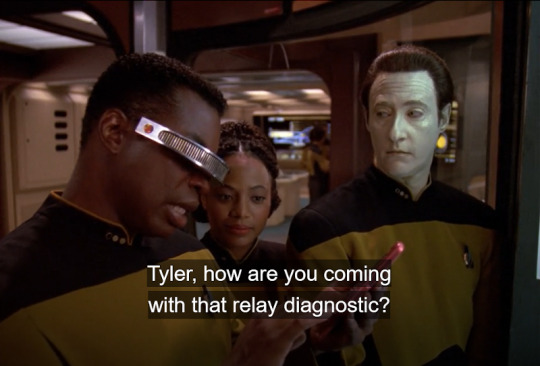

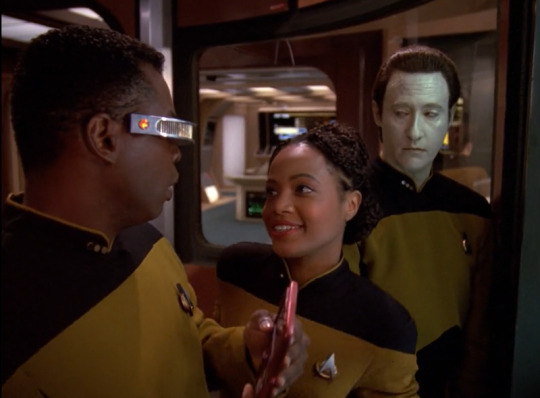


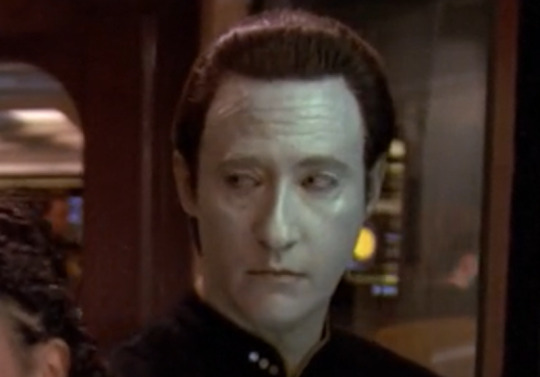
SIR????
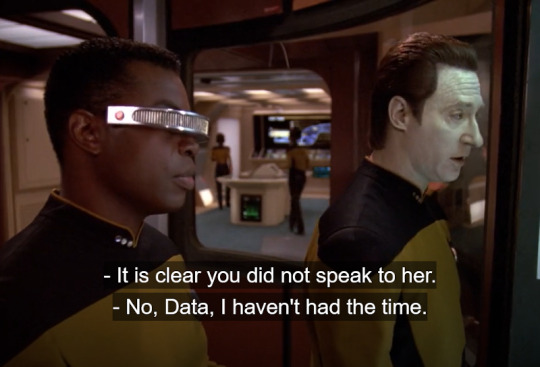
DATA HE IS CLEARLY NOT INTERESTED? CAN YOU COOL IT DOWN A NOTCH???
#daforge#dataforge#geordi la forge#data soong#data tng#tng#data: i dont have emotions :|#also data: hey geordi why havent you rejected her yet. tell her you dont like her geordi. tell her geordi. im gonna tell her geordi. geor#(also shout out to ensign tyler for giving picard busywork so he wouldnt break anything in engineering lol SHE'S A REAL ONE)
2K notes
·
View notes
Text
"Oh no, someone's attracted to the aesthetics of my -punk movement but doesn't know the praxis and history behind it like I do--"
OK. Tell them. Make it a teaching moment. Everyone who's in your movement learned the background from somewhere at some point, maybe this is that point for that person. Give them a jumping off point that they can dive into later.
"Oh but I shouldn't be responsible for teaching baby -punks about the history and the how-tos and--"
OK. Then don't tell them. You don't have to be responsible for teaching people with a budding interest in your group the ins and outs and how-tos. That's fair and valid! It can be a lot of work. Someone else will handle it
"But I'm annoyed that they would try to claim to be part of/be interested in my community without knowing all the details that I know after being in it for months/years/decades, they're dumb, they're posers, they're--"
OK. Then don't engage with them, if it's that bad. Maybe someone else will come around and tell them the history, maybe they'll pick it up on their own, maybe they'll just enjoy the fashion elements for awhile.
"But they shouldn't claim to be part of the -punk community if they don't know the--"
I feel like we have a few options here. People can either talk to them, share the history, share the values, share the praxis. Or they can just chase off anyone who even thinks about dipping a toe in their community, and then wonder why it's dying off later down the line.
I dunno, maybe I'm too naive and patient or whatever. But if people are entering your -punk spaces without knowing The Rundown of what you feel they need to know, maybe being nice about it and informing people instead of immediately assuming stupidity and malicious intent could help you make a new friend. Even the loudest voices in a space had to learn from somewhere, and not everyone has the luxury of being in the space as the History was Happening--whether it's an age thing or a not being aware of the space thing. Or maybe I just don't see what the big deal is behind people hating people who like the aesthetic of something and don't know the behind the scenes history about it yet.
Because I believe in the word 'yet.' No one comes into this world knowing everything about everything, and we're all constantly learning new things. I'm not gonna degrade someone and call them a poser for not knowing what I know. Because if it were me, interested in a scene but getting chased out and called a poser? I wouldn't hit the books and study up, I'd go 'that fuckin sucks, those people sucked' and then avoid anyone and anything having to do with it.
So chase people off and call them posers if you want. But if your community starts dwindling, don't be fucking shocked.
#out of queue#ani rambles#punks and posers#i cant even call this a 4am hot take because its 7pm but like#idk i keep seeing posts about like 'how DARE people think I bought my punk clothes how DARE they not know the how-tos and DIYs'#or 'ugh people only care about the ~aesthetics~ of my movement if you don't know shit get out of here' and like#maybe I'm just a shy ass introverted nerd whos scared of social rejection! but I avoid that shit like the plague#so if someone were to reject me based on not knowing about something I'd never even heard about? something i was JUST getting into?#there's a high chance I'd just scram and never look back. i don't wanna be the one who causes that emotion in someone else#granted this is coming from someone who STILL doesn't know how to make her own patches or worked up the courage to do direct action praxis#outside of offering neighbors to my tomatoes and trying to talk to people about what I'm passionate about#but still imo unless someone's a malicious intentional bad actor i dont see the point in scaring newbies off#thats how movements die imo#i know this is my solarpunk blog but its not a solarpunk specific thing#i think the main post that inspired this was about store-bought versus self-made spiked leather jackets#which honestly just feels petty to me but who knows.#might delete later
2K notes
·
View notes
Text
It may be that if you had always been rejected by those you liked or you got to do things you really didn't feel like in order to not being left out (but still ended up alone), you may now fear being yourself and being seen for real. You may have learned from that experience that no matter what, there's something wrong in you and you may have (even unconsciously) tried to hide from others in any way you could. Maybe you also started to unconsciously either search for more people that would possibly reject you for various reasons (so that if one day you found one and they didn't reject you, you could feel enough) or you started to like people secretly, or people that are "unreachable" to you and you don't have to deal with in your everyday life, so that they could not reject you.
But there's nothing wrong in you. It's just that we cannot be appreciated and accepted by everyone (or by all the people we'd like to), and that some relationships are not the ones for us. Plus, there may also be a problem of having different outlooks and ideas coming in between, or issues that are not compatible among each others. Whatever may be the reason, it won't always be like that.
Don't be afraid of being yourself, of sticking to your values, of being seen for who you are and of receiving a no. It will hurt ofc, but it doesn't mean that you're not worthy or lovable in your entirety or by the whole world: you just didn't click with that person/people and that's okay. There are hundreds of others willing and waiting to click with you. Give yourself and them a chance.
#words#healing#important#positivity#thoughts#self love#self healing#positive thinking#healingjourney#self care#relationships#self help#self embrace#emotions#trauma#emotional abuse#neglect#abandonment#rejection
329 notes
·
View notes
Text
Choi Han sees a weird stick in Cale’s hair.
“Oh, wait Cale-nim, let me…” With the slight height advantage, Cale doesn’t actually have a choice but to let the swordmaster do as he wishes.
For moment he fiddles around, trying to grab the elusive, tangled object, when he suddenly feels Cale lean into his hand. He watches with bated breath as Cale closes his eyes.
(‘Ah, I’m so tired that I’m leaning on Choi Han. Aigoo, he must think I’m pathetic.)
Choi Han spends another minute to get the stick out, claiming that it was particularly stuck in his long hair. He burns this memory into his mind while also promising to never tell another soul.
Eruhaben is next. He notices the red head’s soft locks, freshly washed and neatly air-dried with magic. As a dragon, he doesn’t think twice about the temptation, standing from his spot on the couch to test if Cale’s hair is even half as soft as it appears to be.
It is, he learns.
(Cale shivers. Is Eruhaben threatening him? Just in case, Cale bows his head to hide his fearful expression.)
The dragon watches with amusement, thinking that it’s only natural to offer one’s head to a dragon as powerful as him. Until he feels Cale almost… press into his palm absentmindedly. Eruhaben vividly feels the exact moment that his heart melts into a puddle of affection.
He definitely will use this against the bastard next time he has the opportunity.
Oddly, On and Hong figure it out next. Cale is sitting in his usual chair, reading a book with his hair falling into his face picturesquely. On recalls when Rosalyn did her hair up with a pretty pin, making it easy to move around without getting in her face.
On considers if Cale would mind On experimenting a little, immediately coming to the conclusion that he wouldn’t give two shits.
She transforms into her human form and moves behind the chair. Of course, Cale doesn’t bat an eye at her unusual movements. When she gathers his hair up in her hands, he doesn’t miss a beat, leaning back to give her better access. He only changes the angle of his book so he can still read. Hong observes his sister from Cale’s lap with curiosity.
Her upbeat attitude is ruined quickly because she doesn’t know how to braid nor tie up hair, and is missing the necessary bows and pins to do it in the first place. She runs her fingers through his vibrant red hair as she tries to remember what Rosalyn did.
Hong’s eyes go wide. Cale had stopped reading as his sister continued her ministrations, closing his eyes and leaning back, relaxing into his seat. Hong urgently signals for his sister to witness this.
Her eyes narrow in on the sight with a calculating gaze. She changes the way her hands run through his hair, simply running her fingers through and carefully untangling it instead. Cale’s face gradually loses its constant pinch.
(‘Yes, the children should do whatever they want, even play with my hair.’ Cale internally nods to himself.)
On, unlike Choi Han or Eruhaben, tests her limits. She continues her gentle pattern without pausing. After a few minutes, both of the cats hear Cale’s breathing taper away into a relaxed rhythm. On silently makes eye contact with her brother, and they make a secret promise to not make a big deal about this, lest this trick never work again.
They hear Ron before he enters the room and On casually returns to her car form, stealthily and softly landing on Cale’s lap. Ron enters, pausing at the sight of his puppy young master.
Smiling benignly, he darkly assumes that Cale had been so exhausted that he managed to fall asleep in the middle of reading.
On and Hong don’t correct him.
If Cale has an especially bitter lemon tea that night, he doesn’t make a big deal about it. Not when the crown prince calls him soon after it arrives.
He arrives at the palace where the Crown Prince learns of this spreading secret. Cale uses his superior glib tongue to force a frown on Alberu’s exhausted expression, and the exasperated hyung sighs, walking around to the couch where his dongaeng is sprawled. He places a hand on his shoulder, threatening Cale with a high political position if he doesn’t stop doing dangerous things and causing trouble.
Cale shudders and agrees. Alberu smiles at this, his hand moving to ruffle his adorable dongsaeng’s hair.
(Cale sighs, closing his eyes and humoring his affectionate hyung. He leans back, questioning why everyone has been so touchy lately.)
Alberu feels his heart stop and stutter at the fragile sight. Cale looks completely at ease, slumped in the couch cushions and pressing his head into Alberu’s palm like a cat. His lip is quirked up slightly, but Alberu would bet a golden plaque that Cale hasn’t a single idea on what he looks like right now, otherwise he wouldn’t be even half as relaxed as he is right now.
He resembles a lazy cat. He’s being pet whilst lounging, with a content and pleased expression edging on his face. If this goes on long enough, Cale might even fall asleep.
Alberu continues talking without letting his smile leak through into his words, stroking the top of Cale’s head in an absent minded motion.
(Cale ignores the sneaking chill on the back of his neck, too focused on Alberu’s words about the kingdom. The petting is a bit strange, but Alberu is the crown prince, so he’ll allow it.)
As predicted, Cale doesn’t mention it.
After a minute though, Cale starts to frown, beginning to acknowledge the feeling that he’s being scammed somehow.
“Hyung, do you have a headache?”
Alberu acts like a polite and caring hyung, starting to massage Cale’s head.
(Cale frowns more. Something is definitely going on.)
Cale opens his eyes, protesting. “Your highness, my health is perfect at the moment. You, our shining sun, couldn’t possibly-“ Alberu changes from massaging to running his fingers through Cale’s hair.
(Cale sighs, cutting off. It was just a ploy to play with Cale’s hair. He should’ve expected his highness to scam him in this way too.)
Alberu grins when Cale stops talking, looking resigned to his fate. He goes completely limp, and Alberu’s blunt fingernails scratch against Cale’s scalp gently. Cale visibly shudders at the feeling.
(‘Too scary, what if he scratches and draws blood? If Raon finds out, he’s going to feed me soggy apple pie…’)
Alberu preens at finding Cale’s weakness.
On slyly asks Rosalyn to do up Cale’s hair one day- as an experiment- and is extremely pleased when Cale not only agrees, but he closes his eyes and falls asleep soon after the Mage is done gently tugging his hair into place and adorning it with intricate pins and accessories. Choi Han walks in on this scene and threatens Rosalyn to keep it a secret (after melting a bit on the inside). She agrees with a sly smile.
If only Cale knew how everyone was going to use this to scam him in the future…
Eventually the misconception that Cale likes to have his hair played with goes around the entire group. Cale- of course- is completely clueless. He just thinks that everyone suddenly became obsessed with his hair.
Ron is the only one who can’t get Cale to relax. Even Bud somewhat managed it, but Cale stays vigilant no matter what his old butler does. Ron finds his puppy young master to be amusing.
Cale really doesn’t understand what they want with his hair. Do they want his hair?
(He asks Ron for a trim a few days later. Ron only cuts off the dead ends and leaves it neat but long, much to the young masters displeasure.)
#for the record cale is definitely somewhat enjoying it. he’s just oblivious to his own emotions#and rejects all ideas of enjoying physical affection. bc all he needs is his slacker life and nothing else#so if he gets used to the petting and feels more relaxed afterwards… it’s purely coincidental#tcf#I’ve been mimicking the writing style of tcf recently and I’m not sure if that’s a good or bad thing yet#… I should write smth and ask my sibling to peer review it and tell me if it’s better or worse than my style before#trash of the count’s family#lcf#lout of the counts family#cale henituse#choi han#eruhaben#on and hong#alberu crossman#rosalyn tcf#ron molan#not a reblog
1K notes
·
View notes
Text
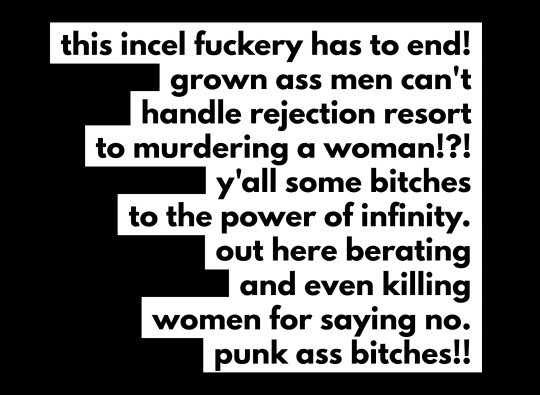
My goodness!!!
#incel#violence against black women#violence against black girls#Samyia Spain#brooklyn#new york#deli#stabbing#twin sisters#veo kelly#park slope#assault#murder#criminal possession of a weapon#rejection#aggression#tragedy#violence#investigation#search#criminal history#robbery charges#community reaction#vigil#grieving father#women's safety#pressure to give phone numbers#public gathering place#neighborhood impact#emotional toll
138 notes
·
View notes
Text
rsd is absolutely insane because it will feel like someone is tearing apart the very core of my being, insulting everything i have done and will ever do, condemning me to death and simultaneously wishing i was never born, when actually they just didn’t like a song i showed them
#rsd#rejection sensitive dysphoria#rejection sensitivity#adhd#actually adhd#neurodivergent#actually neurodivergent#emotional disregulation#👁🗨#🌀
4K notes
·
View notes
Text
I don't want to sound crazy but I need you to know that I require to be told nice things. To be reminded that I am enough. My scars may be healed but they are still scars at the end of the day, and so while it wasn't you who put them there I need reassurance you will not add more. I need to be told I am okay. That I'm enough. That I do matter. That perhaps you won't just leave one day with me confused and wondering what I did wrong.
#lover suggestion#lovers#crush suggestion#crushcore#ldr#long distance relationship#yearning#yearningcore#t4t#rsd#rejection sensitive dysphoria#can you tell i got adhd#my emotions be so unregulated i be needing reassurance#btw i am in therapy but.#its nice to hear nice things#poetry
481 notes
·
View notes
Text
it’s been four months since December 2022 and I’m still not over the fact that Reigen was apparently so haunted by guilt from that one time in S2E2 where he scolded Mob for eating too many french fries that it showed up in the super emotionally charged eyecatcher montage during the series finale.
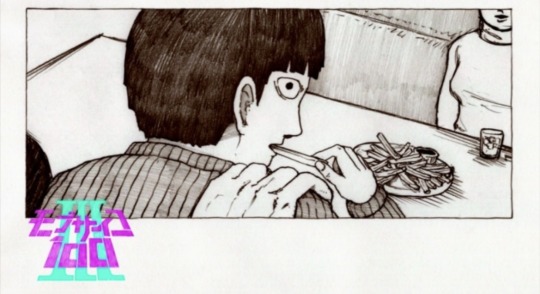
I wonder if reigen will ever find the closure he needs to free himself from the poltergeist of regret that obviously follows him around as a result of this incident. the confession incident really had reigen re-evaluating everything from the past three years.
#okay but this is such an ‘emotionally repressed but also sensitive and doting family member’ thing#it’s hard to explain#but my dad is a gruff and rough-n-tumble farmer man#but he’s also very sensitive and doting#so sometimes he will say something kind of blunt or tease me or scold me over something#and it really won’t even be that bad#but he will sit there for the next couple of hours and stew over whether or not he hurt my feelings#like that shit will haunt him until eventually he calls me and apologizes#bc he’s sensitive but also not super in touch with emotions so he’s not sure where the boundaries are sometimes#and by that point i will have mostly forgotten what even happened in the first place#but i always get the post-joke/scolding regret call#especially bc i was always a kid who was very sensitive to rejection#i dunno if this makes any fucking sense#it’s just very ‘emotionally repressed family member’ core#the girls who know will know#mp100#mob psycho 100#shigeo kageyama#reigen arataka
627 notes
·
View notes
Text
I'm curious, did anyone else have this experience as a kid, of waiting to find the person who wouldn't hate you? Like yeah, your parents acted like you're a waste of space, but you were sure that deep inside there was something more to you, and one day someone would realize that and care for who you really are. And you kept trying to reach out, outside of the home, to find someone who would get you.
And then eventually you found someone you connected to on a deep level and who you felt intensely bonded with, who seemed to accept you and want you for something at last. And when this person suddenly changed their mind and also decided that you were not worth a second glance, it broke something inside of you?
Like you were able to keep resilient against all the abuse if there was one person who was on your side and saw something good in you, but if even that one special person decided you were worthless, then your resilience broke and you couldn't find it in yourself to doubt what everyone around you thought of you, that you were nothing, bad, poisonous, evil.
I keep carrying this shame in me and still trying to prove to myself and to the world that it is not true, but I've never gotten over that intense rejection and reactions of disgust on me being vulnerable, hurt, or wanting to be close. Even if I don't feel it when I'm alone, next to other people I only wait for the moment they'll decide that I'm not worth a second of their time, and that I'm in fact, repulsive in every possible way. Did anyone recover from this?
#toxic shame#toxic guilt#trying to get over emotional abuse#child abuse#abusive parents#overwhelming shame#anxiety around people#social anxiety caused by intense rejection of the entire environment as a kid
239 notes
·
View notes
Text
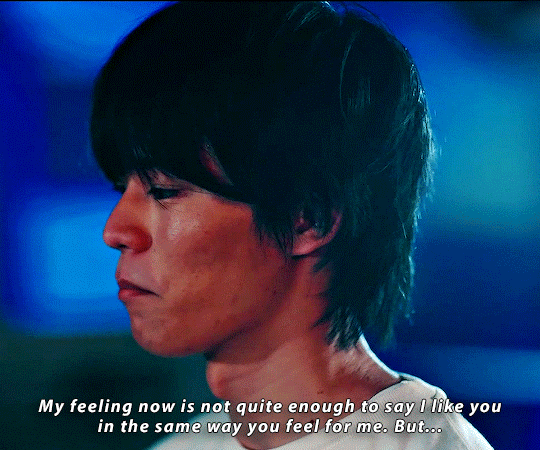


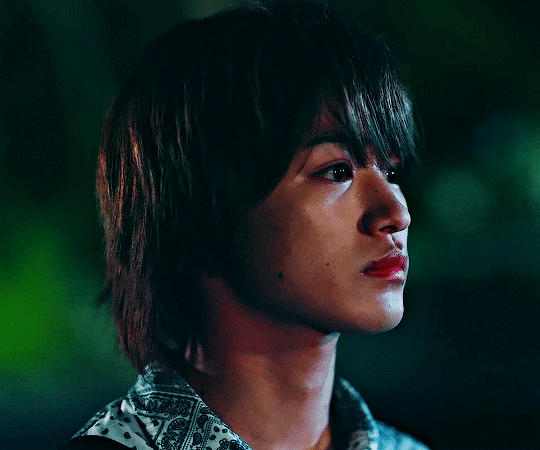

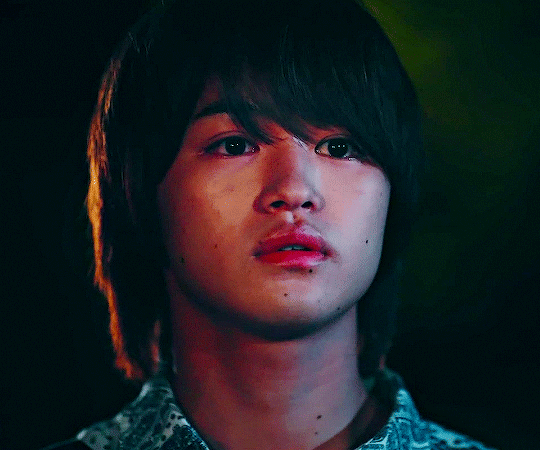
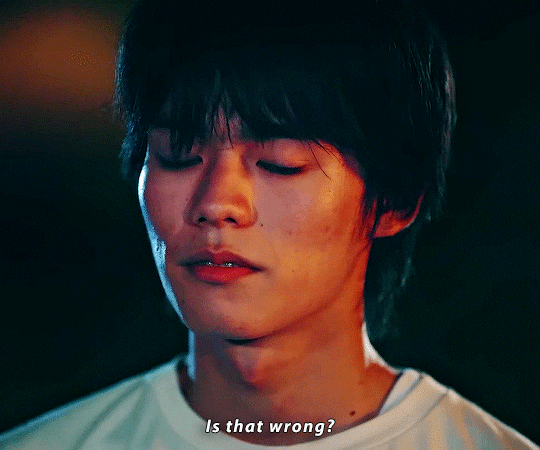
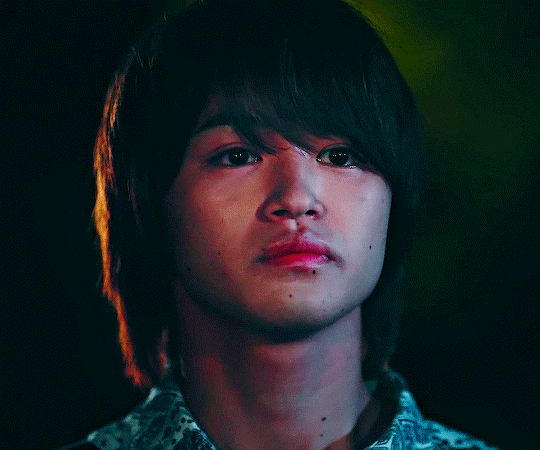
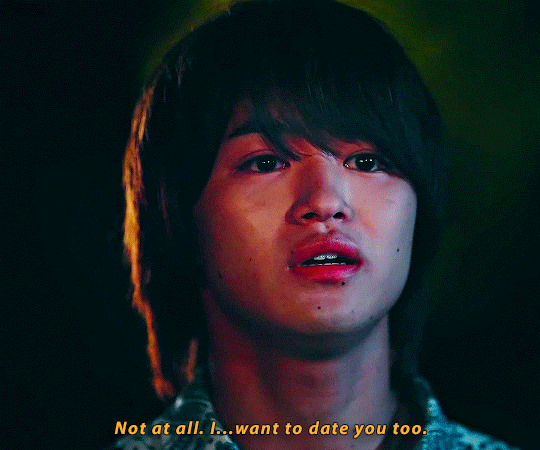
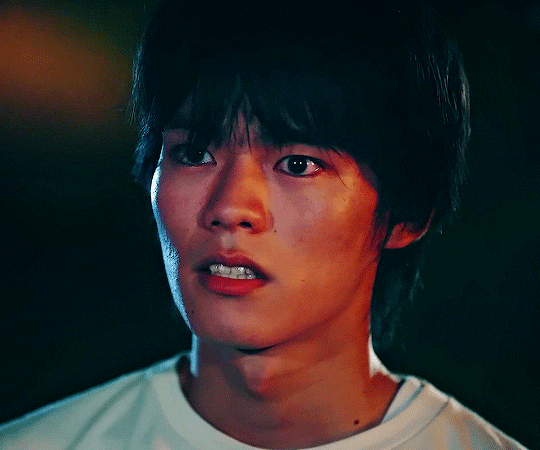
Next year... will I be the only one with feelings? Amane. Sorry! Forget what I just said. I didn't mean to rush you. Forget it. I won't forget. Today I want to answer you about the other day. I had something I wanted you to eat, but I didn't know how to reach out to you. So I didn't contact you. I want to see you.
KIMI TO NARA KOI WO SHITE MITE MO (2023)
君となら恋をしてみても, dir. Matsumoto Hana
#kimi to nara koi wo shite mite mo#hyuga wataru#okura takato#jdramaedit#jdramasource#jdrama#lextag#tuserfaiza#usermare#zeystuff#gif: ktnkwsmm#MYYYY BOYS I AM SO EMOTIONAL :(((#how amane was so scared of rejection that he'd rather run away but ryuji took the courage to finally open up to amane#ynow the lao tzu quote: Being deeply loved by someone gives you strength#while loving someone deeply gives you courage. and yes yes why do I think of these two#I AM JUST NOT READY TO LET THEM GO....#we ignore at this point that I messed up my sharpening settings here#and hate tumblr mobile bc the coloring always looks different *sigh+
223 notes
·
View notes
Text

RAINY REDEMPTION
synopsis: your ex-boyfriend shows up at your doorstep, soaked from the rain and hoping for a second chance.
starring mikage reo!
genre(s): angst/comfort, fluff at the end, exes to lovers
wc- 1.4k
notes: first time trying angst like this. hope you enjoy!!

the last person you had expected to see upon opening your door was your ex-boyfriend of 2 months, mikage reo. he stood before you, soaked from the rain from head to toe, wearing a sheepish smile that contradicted the unease in his eyes. "can i come in?" he asked, his voice laced with uncharacteristic hesitancy. "it's really pouring outside."
stunned and speechless, you merely gestured for him to enter, an invitation he swiftly accepted. as you darted wordlessly to fetch a towel, a tumult of thoughts stormed your mind, each raindrop that fell echoing a question.
what was he doing here? why was he out in the rain? he never ventured into this part of town. what's going on?
shaking off these thoughts, you handed him the towel. grateful, he quickly began drying his hair – the beautiful, fluffy hair you used to run your hands through, to which he'd almost purr as he melted into your touch. the hair that had been long enough for you to braid and accessorize, filling an entire album on your phone dedicated to the different looks you'd given him. it had been months since you last saw it, and now, with no explanation, it was in your apartment.
breaking the silence, you questioned, "what are you doing here, reo?" your voice, calm and level, carried a coldness unfamiliar to him. he disliked it greatly.
"i was taking a walk, and it started raining." he answered simply.
you knew immediately and without a doubt that he was lying. you knew him best, after all.
eyeing him, you demanded, "what are you really doing here?"
a chuckle escaped his lips. that low, boyish chuckle that still sent shivers down your spine. he scratched the nape of his neck before nervously joking, "you got me. you always did know when i was lying."
"what are you doing here, reo?" you snarled, a sharp edge to your voice.
panic and fear washed over his features before he blurted,
"i still love you, y/n."
you took a moment to process his words before your entire world began to spin before your eyes.
your heart pounded, and your vision got fuzzy. your knees went weak, feeling like they might give out. nausea hit you hard, and you wanted to faint, cry, and run away—all at once. it was like a rainstorm of emotions hitting you like a torrent, messing with your whole system.
"..no."
"no?"
"no!" you screamed, tears flowing. instinctively, reo reached out to wipe them away, but you slapped his hand away, making him wince.
"you cannot," you sobbed, "break my heart, tell me it's over, and not talk to me for months,"
reo's eyes began to water too.
"and then come marching back to me, and tell me you fucking love me, reo. no. you cannot do that to me."
"y/n," reo started, but you cut him off.
"i," you breathed through tears, "was just starting to get over you, to come to terms with the fact that you didn't want me around anymore."
by now, reo was freely crying too.
"and then you just waltz through my doorway to tell me you love me? are you kidding me?"
"y/n," reo tried to start again, coming as close to you as he thought you'd let him. "i'm so sorry."
"you're sorry? that's it?" you spat angrily.
"hurting you," he uttered, "was the greatest mistake of my entire life."
gently, he took your hands in his, relief washing over him when you didn't push him away.
"i did so much to tell myself that i'd be fine, that you were just another girl, and i'd find someone else." you almost rolled your eyes.
"but it wasn't true," he breathed. "not one bit. not even close. no one," he squeezed your hands, "could ever come close to you."
"i miss your voice. i miss your laugh. i miss waking up in the morning and seeing you smile. i miss spending time with you doing anything: cuddling and a movie, buying groceries, baking things, going to restaurants. y/n, i miss you so much my entire body hurts when someone mentions your name. i miss you, y/n, and i'm so, so sorry that i hurt you."
you're sobbing uncontrollably now, and his heart aches, knowing he's the one who made you this way. he'd always hated seeing you cry, but he hated it a thousand times more when he was the cause. he vowed to never make you cry like this ever again if you decided to let him back in.
hesitantly, he reached up to your face, fingers trembling with the fear that you'd push him away once more. luckily, you don't. you don't slap him, nor do you yell at him. instead, you let him tenderly wipe the tears from your skin, a silent ode to his love. it felt like a soothing melody in the midst of chaos, a gentle reassurance. you allowed him to cup your tear-stained face, a silent acknowledgment that, in this fragile moment, a sliver of hope had found its way into both of your hearts.
"y/n, i need you. the months we've spent apart have torn me apart completely. so much so that i couldn't even get out of bed to get to practice. nagi had to come get me out of bed, and that should really tell you something."
he winced as he observed your unamused expression, then took a deep breath.
"i know i can't change the past. no matter how much i wish i could, i will never be able to take back the harsh words i said. i will never be able to undo my horrible actions. i know i was a terrible boyfriend to you, y/n, but please. i love you. i know i need to respect your wishes and boundaries, but if you still love me too, i'm not going anywhere." he looked at you desperately, his purple orbs silently pleading with you. "do you?"
silence lingered, the air thick with trepidation. then, you broke down again, burying your head in his shoulder. "of course i do," you mumbled softly, sobbing. relief deluged his body, and his hold on you tightened ever so slightly.
"reo, i love you with every fiber of my being. i love you so much that i never stopped thinking about you for a single minute since we split. i love you so much it took all of my willpower not to jump into your arms the moment i opened the door. reo, i love you so much that it scares me." you confessed, your voice no higher than a whisper. if he hadn't been desperately clinging onto your every word and move, he wouldn't have heard it.
"then please. one more chance. we can make this work, i promise. i swear to you with my life that i'll be better. i'll make you happy. i'll do everything in my power to be the best lover you've ever had." he looks at you anxiously, trying to read your expression. "we can take it slow. ease back into it. but please don't give up on me, on us, just yet. im begging you."
in the quiet aftermath that followed his plea, a heavy silence settled. the air thickened as his words lingered, creating an atmosphere filled with uncertainty and anticipation. your contemplative gaze met his desperate one, and for a moment, time stood still.
"please, y/n. i need you."
you stayed silent for a bit, and he held his breath the entire time. his heart was beating so fast he thought it'd leap out of his body.
"ok." you finally sighed. "let's give it another shot."
elation, bright as the sun after rain, soared through his body as he engulfed you in his embrace. the warmth flooded all your senses as he squeezed you tight, never wanting to let you go.
"thank you," he whispered, tears soaking your shirt. "thank you so, so much."
a nod subtly affirmed, an unspoken acknowledgment of the gravity in the air. "yeah," you breathed gently, taking in what had just occurred. "it'll be ok. we'll be ok."
"i love you," he sobbed, the words pouring out in earnest. "i love you so, so much."
excitement and joy rushed through his body like a heavy downpour upon hearing the four magical words you next uttered:
"i love you too."

© 𝐄𝐓𝐎𝐈𝐈𝐋𝐄 𝟐𝟎𝟐𝟒 please do not copy or repost my work on any other site. interactions appreciated! 🤍
#ami writes 💌#woah i wrote this all in one go#crazy#its the reo effect#i thought abt rejecting him but i was like nah i dont have that kind of emotional capacity#but wow that took me like over an hour#i hope this is good#ive never written smth like this#feedback would be appreciated! ^^#reo x reader#reo fluff#reo angst#reo comfort#reo imagines#reo x y/n#reo x you#exes to lovers#blue lock x reader#bllk x reader#bllk angst#blue lock angst
242 notes
·
View notes